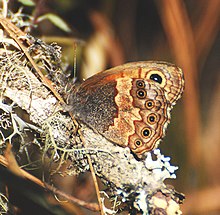Euptychiina
| Euptychiina | |
|---|---|
 |
|
| Arizona pine satyr (Paramacera allyni) | |
| Scientific classification | |
| Kingdom: | Animalia |
| Phylum: | Arthropoda |
| Class: | Insecta |
| Order: | Lepidoptera |
| Family: | Nymphalidae |
| Tribe: | Satyrini |
| Subtribe: |
Euptychiina Reuter, 1896 |
| Genera | |
|
About 44, see text |
|
About 44, see text
Euptychiina is one of the largest subtribes of the butterfly subfamily Satyrinae (family Nymphalidae). The only two comprehensive studies that include Euptychiina are the works of L. D. Miller and Walter Forster, though the latter is now largely considered obsolete.
Although the classification of brush-footed butterflies (Nymphalidae) is currently under heavy revision, the Euptychiina is still little-studied by taxonomists. In fact, the group is so difficult to classify that Bernard d'Abrera placed almost all Euptychiina in a so-called wastebasket genus that he called "Euptychia" in his popular guide to Neotropical butterflies.
A recent study proposes a hypothesis for the evolutionary relationships of Euptychiina, including estimates of time for the origin and diversification of major lineages, and also including a theory of biogeography for the group. A recent study has shed some light on the taxonomy of the Taygetis clade and synonymized some genera and proposed new species combinations. Moreover, Freitas et al. described a new monotypic genus, Sepona, to accommodate the species Euptychia punctata, and its junior subjective synonyms Euptychia griseola and Taygetis indecisa, both formerly conceived within the genus Harjesia.
Listed alphabetically:
...
Wikipedia
